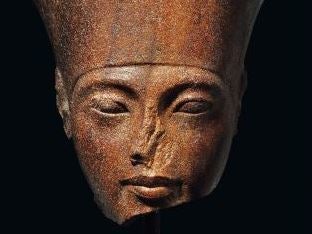Egypt investigates London Tutankhamun statue sale
‘If it’s proven that any piece has been illegally moved out of the country, we will take legal action,’ antiquities ministry says

Your support helps us to tell the story
From reproductive rights to climate change to Big Tech, The Independent is on the ground when the story is developing. Whether it's investigating the financials of Elon Musk's pro-Trump PAC or producing our latest documentary, 'The A Word', which shines a light on the American women fighting for reproductive rights, we know how important it is to parse out the facts from the messaging.
At such a critical moment in US history, we need reporters on the ground. Your donation allows us to keep sending journalists to speak to both sides of the story.
The Independent is trusted by Americans across the entire political spectrum. And unlike many other quality news outlets, we choose not to lock Americans out of our reporting and analysis with paywalls. We believe quality journalism should be available to everyone, paid for by those who can afford it.
Your support makes all the difference.Egypt has launched an investigation into the planned sale of a 3000-year-old stone statue of King Tutankahmun which is expected to take place in London next month.
Officials in the country are concerned that the piece, known as the Amen Head, may have been looted from the country.
“If it’s proven that any piece has been illegally moved out of the country, we will take legal action with the Interpol,” a spokesperson for Egypt’s Ministry of Antiquities said. “We will never allow anyone to sell any ancient Egyptian artefact.”
The department would coordinate with Egypt’s Ministry of Foreign Affairs to recover the bust if the allegation was proven, they added.
“It seems that this sculpture was looted from [Luxor’s] Karnak Temple,” Zahi Hawass, the country’s former antiquities chief, alleged.
He added that the Christie’s auction house “would not have any proof whatsoever of its ownership”.
The statue is owned and being sold by The Resandro Collection, described by Christie’s as “one of the world’s most renowned private collections of Egyptian art”.
It said it did not have concerns over the statue’s ownership.
“Ancient objects by their nature cannot be traced over millennia,” a Christie’s spokesperson said. “It is hugely important to establish recent ownership and legal right to sell which we have clearly done. We would not offer for sale any object where there was concern over ownership or export.
“The work has been widely exhibited and published and we have alerted the Egyptian embassy so they are aware of the sale. There is a long-standing and legitimate market for works of art of the ancient world, in which Christie’s has participated for generations. Christie’s strictly adheres to bilateral treaties and international laws with respect to cultural property and patrimony.”
The auction house expects the “brown quartzite head” of the pharaoh to fetch more than £4m when it is auctioned on 4 July.
The Resandro Collection acquired the sculpture “from Heinz Herzer, a Munich-based dealer, in 1985”.
“Prior to this, Joseph Messina, an Austrian dealer, acquired it in 1973-74 from Prinz Wilhelm von Thurn und Taxis who reputedly had it in his collection by the 1960s,” a Christie’s spokesperson added.
In January Egypt said it had recovered an ancient stone tablet which was illegally smuggled out of the country to the UK.
The country recovered the artefact after it was found for sale in an unnamed London auction house.
Join our commenting forum
Join thought-provoking conversations, follow other Independent readers and see their replies
Comments